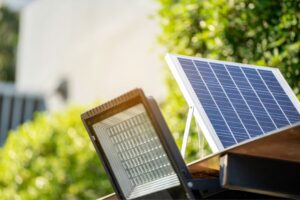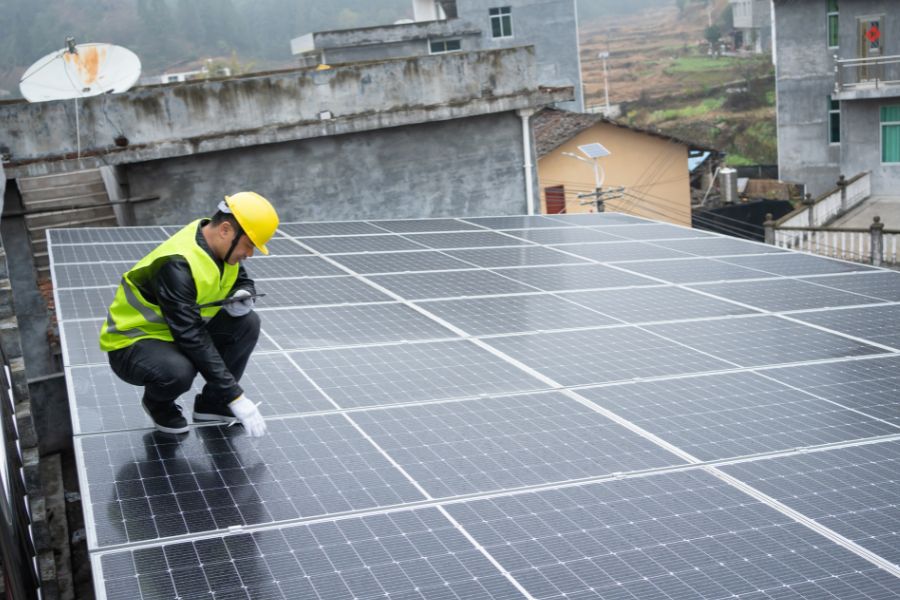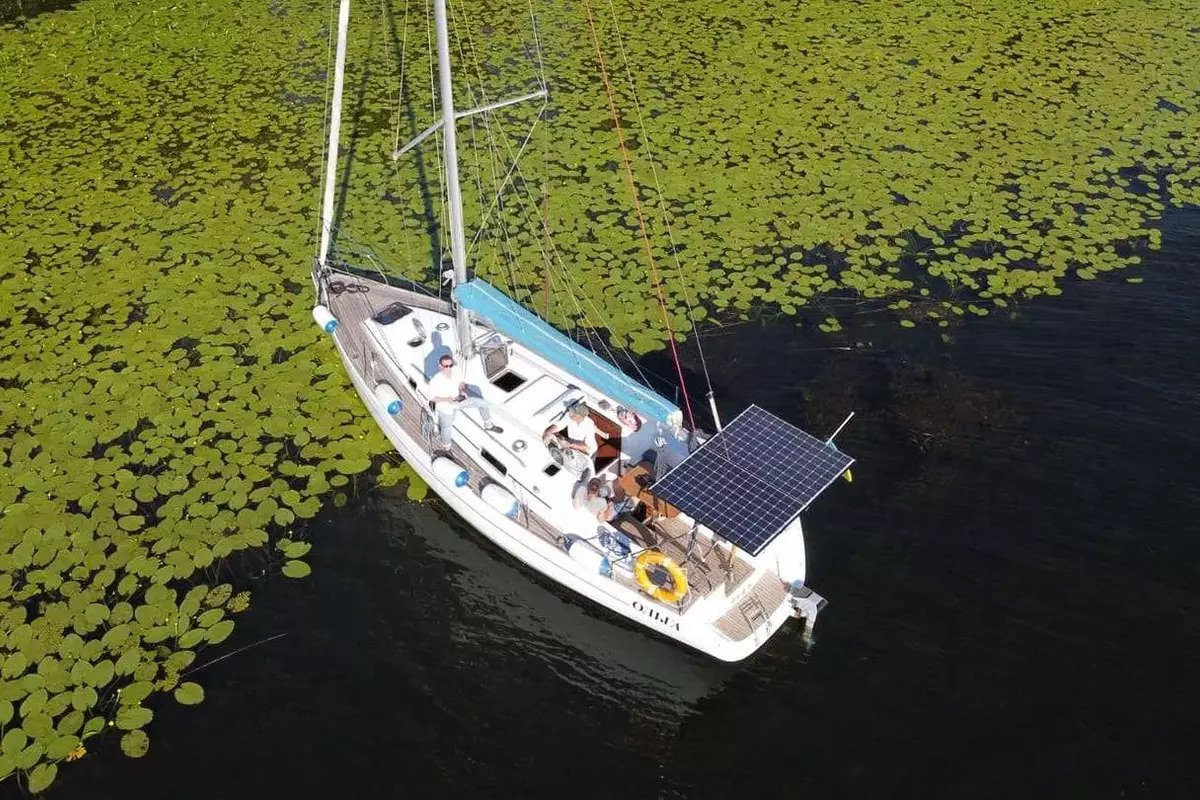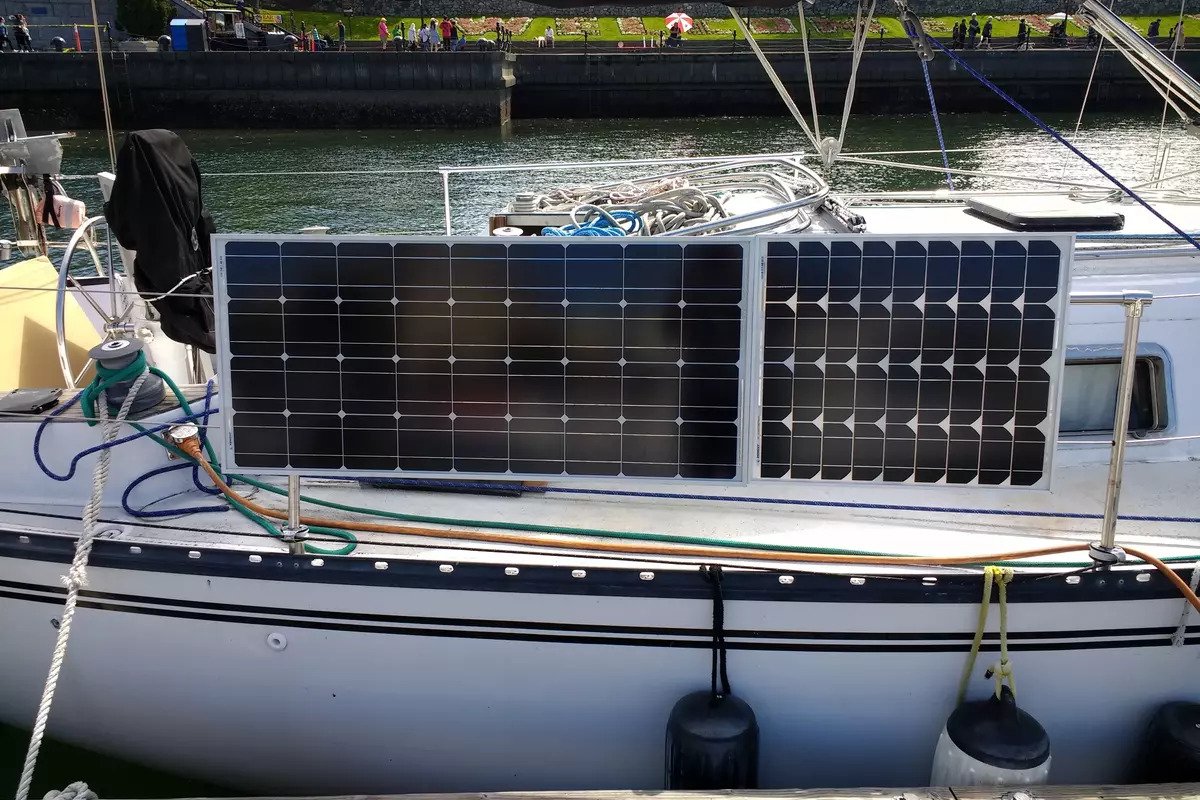In the quest for cleaner and more sustainable energy sources, solar power has emerged as a shining star. Solar panels, which harness the sun’s energy and convert it into electricity on a sunny or cloudy day, have become increasingly popular for their eco-friendly credentials and potential cost savings. Among the various solar panel options available, the 100-watt solar panel stands out as a versatile and compact choice.
In this article, we’ll delve into what a 100-watt solar panel can power and explore the potential applications that make it an appealing choice for both off-grid enthusiasts and environmentally-conscious individuals.
Understanding the Basics – How Solar Panels Work
Before delving into how many solar panels you might need or the solar panels output, it’s crucial to comprehend the fundamental principles of solar energy conversion. Solar panels, also referred to as photovoltaic panels, contain multiple solar cells composed of semiconductor materials. When sunlight strikes these cells, it stimulates the electrons within, generating an electric current that can be harnessed for various applications. The power output of a solar panel is measured in watts, with a 100-watt panel capable of producing 100 watts of electricity under optimal conditions.
To install solar panels effectively, you must grasp this foundational knowledge. Understanding how much energy can be generated by a solar panel is the first step toward harnessing the sun’s power for your specific needs.
What Can a 100-Watt Solar Panel Power?
1. Charging Small Electronics
When considering how many solar panels you need or understanding the solar panel output for your energy needs, one of the most practical applications is using a 100-watt solar panel to charge small electronic devices. This encompasses a wide range of gadgets such as smartphones, tablets, laptops, and power banks. These panels offer a convenient and eco-friendly solution for keeping your essential tech gear charged, whether you’re on the go or residing off the grid.
The beauty of this solution lies in its portability and ease of use. Many portable solar chargers equipped with USB outputs are explicitly designed to complement 100-watt panels. They efficiently convert sunlight into electrical energy, allowing you to stay connected and powered up, all while embracing the benefits of a sustainable solar power system. So, if you’re wondering how much energy you can harvest from a 100-watt solar panel, charging small electronics is a practical and everyday application that brings eco-conscious living to the palm of your hand.
2. Lighting
When you’re exploring how to make the most of your solar power system, don’t overlook the potential for illuminating your surroundings with the help of multiple solar panels. A 100-watt solar panel can be remarkably useful for powering lighting solutions in remote areas, offering a sustainable and cost-effective way to keep your environment well-lit. Whether it’s cabins tucked away in the wilderness, camping sites beneath the stars, or other off-grid locations, these solar panels can keep energy-efficient LED lights shining bright.
What sets this application apart is the possibility of integrating a battery storage system with your solar panels. Such a setup ensures you have consistent lighting, even when the sun has set. This means your energy consumption can be optimized, and you won’t have to worry about running out of power during the night. So, if you’re pondering the potential of solar panels for more than just charging small devices, lighting up your remote or off-grid spaces is a practical and sustainable way to harness the energy produced by your solar panels.
3. Water Pumping
When it comes to making the most of your solar panel system, consider the versatility and potential of harnessing solar energy for water pumping. Solar panels have the capacity to power small water pumps, which can prove invaluable for various agricultural applications, particularly in rural areas. These systems can be highly efficient in tasks like crop irrigation and providing water for livestock.
The utilization of a 100-watt solar panel, combined with an efficient water pump, offers a sustainable and eco-friendly solution to ensure a consistent and reliable water supply. The key benefit of such an arrangement is that it minimizes the need for grid power or fuel-driven generators, reducing operating costs and environmental impact.
For remote locations and agricultural settings where access to electricity is limited, or where it is simply more practical to rely on solar power, the application of a 100-watt solar panel for water pumping can greatly enhance water access and make it a more sustainable resource. By tapping into the solar panel system’s ability to produce solar energy efficiently, this setup can significantly contribute to sustainable water management. Whether you choose a portable solar panel system or install flexible solar panels in a fixed location, this eco-friendly approach is a win-win for both agricultural productivity and the environment.
4. Camping and RVs
For camping enthusiasts and RV adventurers, the use of a 100-watt solar panel can be a game-changer, enabling you to savor the beauty of the great outdoors without sacrificing essential modern conveniences. Whether you’re traversing the country in your motorhome or boat or setting up camp in the wilderness, this compact solar solution can power your recreational vehicle’s appliances, charge batteries, and cater to your camping needs.
The beauty of a single solar panel is its portability and ease of installation, making it a perfect fit for RVs and campers. When connected to your RV’s electrical system, a 100-watt solar panel can harness sunlight during peak sun hours, efficiently converting it into electrical energy. This stored energy can then be used to charge your RV’s batteries, keeping your lights, appliances, and devices operational, even when you’re far from traditional power sources.
Imagine waking up to the soft hum of your coffee maker, charging your devices, or running your microwave while surrounded by nature’s splendor, all thanks to the power of a 100-watt solar panel. It’s a small investment with substantial benefits for those who crave adventure without sacrificing comfort. With this solution, you can fully embrace the serenity of the outdoors without sacrificing the convenience of modern life.

5. Emergency Power
When the lights go out and a power outage strikes, a 100-watt solar panel can be a lifeline, providing a ray of hope in times of darkness. Its ability to generate solar power offers a practical solution to keep essential devices and appliances running, ensuring your safety and comfort during emergencies.
Whether it’s medical equipment vital for your well-being, communication devices to stay connected with loved ones, or small appliances for basic needs, a 100-watt solar panel can provide the electricity you need. This capacity to produce solar power is especially valuable when conventional power sources fail, and you find yourself in a critical situation.
For the utmost reliability during power outages, a battery storage system complements the solar panel’s capabilities. This storage system stores excess energy generated during the day, allowing you to tap into stored power when the sun goes down or during cloudy days. With this setup, you can ensure continuous power, creating a safety net that gives you peace of mind in any emergency scenario.
In uncertain times, the ability to rely on a 100-watt solar panel for emergency power is a testament to the versatility and resilience of solar energy. It’s not just about the energy output but the sense of security it provides when you need it the most.
6. Educational and DIY Projects
Solar panels are not just practical sources of energy; they’re also fantastic tools for educational and DIY projects. A 100-watt solar panel, with its manageable size and power output, serves as an ideal platform for demonstrating the principles of solar energy in an engaging and hands-on manner.
In educational settings, such as classrooms and science labs, a 100-watt solar panel can become a dynamic tool for teaching students about renewable energy. It helps them grasp the fundamental concepts of how solar panels work, from the interaction of sunlight with solar cells to the generation of electricity. These panels are not only informative but also inspiring, sparking curiosity and a deeper understanding of sustainability and environmental issues.
For DIY enthusiasts, a single solar panel can serve as the foundation for exciting projects. Whether it’s building a solar-powered charging station for small devices, constructing a solar oven for outdoor cooking, or creating a portable solar generator, a 100-watt solar panel offers ample power to fuel your creativity. These DIY endeavors provide a tangible way to harness the potential of solar energy and encourage innovation in the renewable energy field.
The beauty of a 100-watt solar panel lies in its versatility. It’s not just about its solar panel output but the vast potential it holds for fostering knowledge and innovation. Whether you’re an educator looking to inspire the next generation of environmental champions or a DIY enthusiast eager to explore the possibilities of solar energy, most solar panels offer endless opportunities for exploration and learning.
Factors Affecting Performance
While a 100-watt solar panel is versatile, its performance can vary based on several factors:
1. Sunlight
The efficiency of a solar panel depends on the amount and intensity of sunlight it receives. Panels perform best in full, direct sunlight.
2. Weather Conditions
Cloudy or overcast days will reduce the panel’s efficiency. However, modern panels are designed to generate power even in less-than-ideal conditions.
3. Angle and Positioning
The angle and positioning of the panel relative to the sun also affect its performance. Optimizing its orientation can significantly increase power generation.
4. Battery Storage
A battery system is essential for storing excess power generated during the day for use at night or on cloudy days.
Conclusions
In the world of renewable energy, a 100-watt solar panel might seem small, but its potential is significant. From charging your phone to providing power in remote areas and even in emergencies, these compact panels have a wide range of applications. Their simplicity and versatility make them an accessible and eco-friendly choice for those looking to dip their toes into the world of solar energy. As technology continues to advance, we can expect even more efficient and powerful options in the future. So, if you’re considering harnessing the sun’s energy, a 100-watt solar panel is a great place to start, offering a glimpse into the sunny possibilities of a sustainable future.




